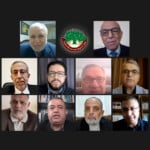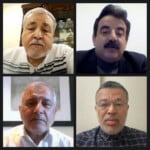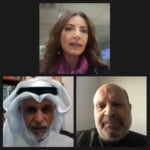On 27/11/2024, Al-Zaytouna Centre for Studies and Consultations hosted a two-session panel discussion via Zoom, titled Future Prospects of Operation al-Aqsa Flood. The event brought together specialists, researchers and experts in Palestinian political affairs and regional issues.
The first session, moderated by Jawad al-Hamad, Director General of the Middle East Studies Center in Amman, featured four presentations. Ahmed el-Helah, a Palestinian writer and political analyst, opened the session by outlining two scenarios for the aftermath of Operation al-Aqsa Flood and the political horizon. The first scenario envisions the Israeli army achieving victory within months, resulting in the occupation of the Gaza Strip (GS), the annexation of the West Bank (WB) and Jerusalem, regional normalization and political realignment. The second scenario foresees the resistance and Palestinian people enduring a prolonged war of attrition until the return of President Trump, potentially leading to either the complete Israeli withdrawal from GS based on Palestinian conditions or the Israeli retreat from significant parts of the Strip while maintaining control over crossings and border areas. In both outcomes, GS would be administered by a Palestinian authority in which Hamas would not take a leading role.
Regarding the future of WB and GS, el-Helah mentioned that discussions between Tel Aviv and Washington might focus on two ideas: annexing WB and Jerusalem under Israeli sovereignty with US recognition, and establishing a demilitarized, autonomous Palestinian entity under Israeli control, including oversight of its land, air and sea borders. These developments must prompt Hamas and other Palestinian resistance groups to prepare for potential worst-case scenarios.
Mueen Taher, Director of the Arab Center for Research and Policy Studies in Jordan, presented the second paper, emphasizing that the next phase of the war in the GS will likely be a war of attrition. He noted that the resistance is capable of sustaining this approach for an extended period, effectively preventing Israeli forces from gaining full control of the entire GS.
Taher expressed concern that Israel might achieve through political maneuvering what it failed to accomplish through its genocidal war, particularly by deploying Arab and foreign forces to disarm the resistance. He argued that this conflict should be seen as an existential battle, both for the resistance and for Israel. Taher emphasized that the resistance has the capacity to endure and prevail in the medium and long term, though it may require adapting its methods and tactics.
Taher emphasized the need to reconsider certain tactics in WB, placing greater focus on covert action. He highlighted steadfastness within the homeland as the cornerstone of the next stage, which he said depends on the resilience of the people, support from Arabs and Palestinians abroad, and the persistence of resistance in all forms, including armed resistance. This also entails resisting normalization, mobilizing Arab and international communities, and intensifying efforts to isolate Israel globally. Taher stressed the importance of preparing for a decisive battle expected to extend far beyond three months, noting that the Trump term will present even harsher challenges.
Dr. Muhannad Mustafa, General Manager of Mada al-Carmel – Arab Center for Applied Social Research, presented the third paper. He argued that the rise of statism and the resurgence of militantism in Israeli society could lead to significant internal disintegration. He explained that Israel’s initial strength at its founding stemmed from fostering the opposite dynamic—emphasizing statism while curbing militantism—unlike the current government’s approach.
Mustafa noted that there is a political failure in the Israeli narrative, particularly regarding its victimhood stance and the level of Israeli popular protest. He emphasized that if this failure is not met with Palestinian political action, it could result in the erosion and fragmentation of the international achievements that have been made.
Dr. Ma’mun Abu Amer, a political writer and specialist in Israeli affairs, presented the fourth paper, noting that there are no guarantees the ceasefire agreement reached in Lebanon will hold beyond the 60-day window. Regarding GS, he explained that, with the resistance shifting from a centralized to a more dispersed structure, the Israeli army is likely to persist in targeting the resistance’s popular support, systematically destroying neighborhoods, and attempting to dismantle the military assets of resistance groups.
Abu Amer stated that despite the ceasefire, the Lebanon front will continue to serve as a support front, with the army remaining mobilized, though less intensively than before. He noted that the ceasefire would provide the Israeli army with greater opportunity to advance its combat plans in GS. Additionally, he suggested that Hizbullah’s agreement to a ceasefire, separate from GS, could represent a political victory for Netanyahu, potentially facilitating his push for a ceasefire in GS as well.
In the second session, moderated by Prof. Dr. Mohsen Mohammad Saleh, General-Manager of al-Zaytouna Centre for Studies and Consultations, four working papers were presented. The first, by Ziad Bhies, a researcher specializing in Jerusalem affairs, emphasized the growing urgency surrounding al-Aqsa Mosque as a central issue for protecting its identity and sanctity. He warned that efforts to resolve the fate of Jerusalem would intensify, opening two new areas of challenge: the Israeli government’s attempt to take control of [United Nations Relief and Works Agency for Palestine Refugees in the Near East] UNRWA headquarters and facilities, and the ongoing wave of diplomatic missions being moved to Jerusalem, with Israel being recognized as its capital. Bhies suggested that international political and legal campaigns could help preempt or slow these developments. He also noted that WB would likely become the next battleground, with further attempts at annexation and transfer, which would require empowering resistance in all its forms.
Bhies believes that efforts to manifest the third wave of the resistance’s revival will likely continue within the current conditions. However, the fundamental condition for its transformation into a comprehensive movement remains unmet, as the Palestinian Authority (PA) has neither adopted nor tolerated its existence. This creates a situation where the PA’s erosion and the weakening of its security forces become prerequisites for the rise of the resistance. The PA itself faces an existential crisis, particularly with the annexation of WB, which would eliminate any justification for the existence of a Palestinian entity. However, as the Israel and the US acknowledge the importance of the PA’s security role, the “seven islands” scenario is likely to resurface, potentially linking the responsibility for the PA to Jordan as an Arab guarantor state. This scenario places both the PA and official Jordan at the heart of the threatened Arab regimes as the battle shifts to WB.
The second paper was presented by ‘Atef al-Joulani, an expert in Palestinian and Jordanian political and strategic affairs. He suggested that the current limited scope of the battle at the official Arab level is likely to persist, with a shift in the roles of Arab mediators in ceasefire efforts following Trump’s assumption of the presidency. According to al-Joulani, the influence of Egypt and Qatar will diminish, while Saudi Arabia’s role will grow. Furthermore, he noted growing concerns among Jordan, Egypt and the PA regarding the implementation of Israel’s plan to annex Area C of WB.
Al-Joulani noted that if the Israeli right-wing accelerates its efforts to implement the annexation plan and targets Jerusalem, this would likely escalate popular mobilization. However, the current stance of most Arab governments will continue to limit the actions of the Arab street. With Trump’s return to power, a new wave of Abraham Accords is expected, aimed at overcoming the obstacles to normalization with Saudi Arabia. He also suggested that Arab countries may seek to strengthen the PA’s role, with many more willing to play a political and security role in GS after the war, should the Trump administration request their involvement. The negative stance of many Arab governments toward Palestinian resistance movements will persist, while Arab governments are expected to remain sensitive to the influence of Iran and its allies regarding Operation al-Aqsa Flood.
Dr. Ibrahim Fraihat, an associate professor in international conflict resolution at the Doha Institute for Graduate Studies in Qatar, presented the third paper. He noted that while the arrival of a new administration in the White House signals a shift towards multipolarity in the international system, this change should not be overstated. Fraihat outlined several potential scenarios for the Palestine issue, ranging from very negative outcomes, such as the annexation of Area C or even the entire WB, to the possibility of a deal brokered with key Arab players. He emphasized that the Arab Gulf states, particularly Saudi Arabia, are in a position to engage in the deals that Donald Trump seeks. Fraihat also stressed the importance of Jordan’s cooperation for the success of any deal and highlighted that Palestinian approval is essential, as, despite their weakness, Palestinians continue to represent a legitimate state.
Kassem Kassir, Media and Public Relations Officer at the Civilization Center for the Development of Islamic Thought, stated that Hizbullah and the Islamic Resistance did not intend to engage in an open war with Israel. However, it is evident that Israel was preparing for such a war. Despite this, the resistance successfully fought back and prevented Israel from achieving significant gains. Kassir emphasized that while coordination, support, and cooperation between the axis of Arenas and the axis of resistance will continue, it will take a new direction in response to shifting dynamics. This requires reassessing current strategies and developing new approaches to support the Palestine issue in the upcoming phase.
Kassir commented on the cessation of hostilities in Lebanon, stating that it represents an executive test lasting 60 days, after which the situation can be reassessed. He noted that Israel might attempt to impose new dynamics on the frontline villages in the south, leading to a cautious phase open to various possibilities. Additionally, the truce is influenced by internal Lebanese conditions, developments in GS, and the impact of the US elections and Trump’s inauguration on 20/1/2025.
At the conclusion of the two sessions, a group of experts and specialists provided important interventions and comments on the presented papers, with the presenters offering responses and clarifications to the discussants’ questions and remarks.
Al-Zaytouna Centre for Studies and Consultations, 28/11/2024







Leave A Comment